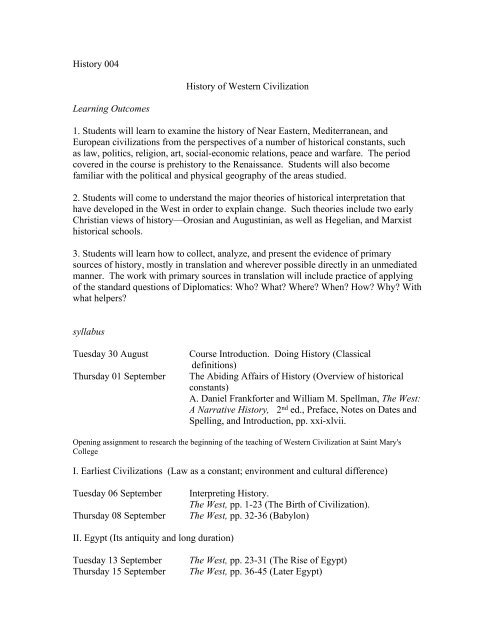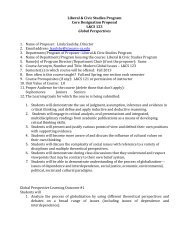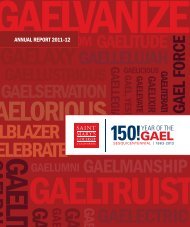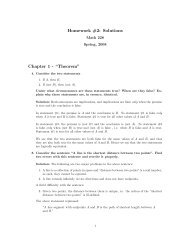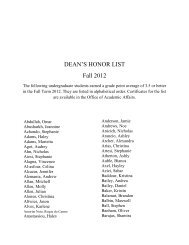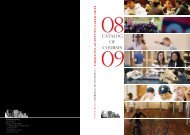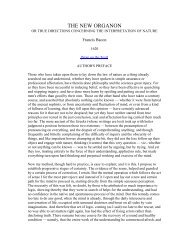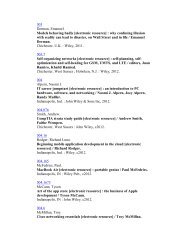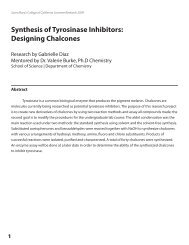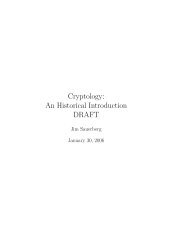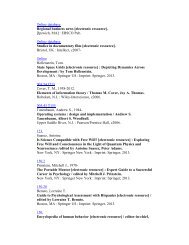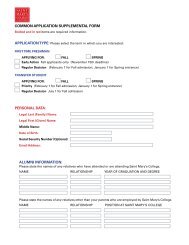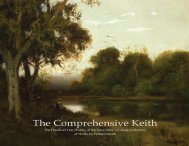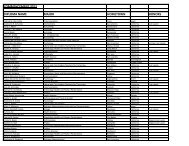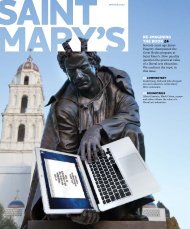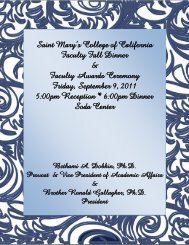Syllabus - Saint Mary's College of California
Syllabus - Saint Mary's College of California
Syllabus - Saint Mary's College of California
Create successful ePaper yourself
Turn your PDF publications into a flip-book with our unique Google optimized e-Paper software.
History 004<br />
History <strong>of</strong> Western Civilization<br />
Learning Outcomes<br />
1. Students will learn to examine the history <strong>of</strong> Near Eastern, Mediterranean, and<br />
European civilizations from the perspectives <strong>of</strong> a number <strong>of</strong> historical constants, such<br />
as law, politics, religion, art, social-economic relations, peace and warfare. The period<br />
covered in the course is prehistory to the Renaissance. Students will also become<br />
familiar with the political and physical geography <strong>of</strong> the areas studied.<br />
2. Students will come to understand the major theories <strong>of</strong> historical interpretation that<br />
have developed in the West in order to explain change. Such theories include two early<br />
Christian views <strong>of</strong> history—Orosian and Augustinian, as well as Hegelian, and Marxist<br />
historical schools.<br />
3. Students will learn how to collect, analyze, and present the evidence <strong>of</strong> primary<br />
sources <strong>of</strong> history, mostly in translation and wherever possible directly in an unmediated<br />
manner. The work with primary sources in translation will include practice <strong>of</strong> applying<br />
<strong>of</strong> the standard questions <strong>of</strong> Diplomatics: Who What Where When How Why With<br />
what helpers<br />
syllabus<br />
Tuesday 30 August<br />
Thursday 01 September<br />
Course Introduction. Doing History (Classical<br />
definitions)<br />
The Abiding Affairs <strong>of</strong> History (Overview <strong>of</strong> historical<br />
constants)<br />
A. Daniel Frankforter and William M. Spellman, The West:<br />
A Narrative History, 2 nd ed., Preface, Notes on Dates and<br />
Spelling, and Introduction, pp. xxi-xlvii.<br />
Opening assignment to research the beginning <strong>of</strong> the teaching <strong>of</strong> Western Civilization at <strong>Saint</strong> <strong>Mary's</strong><br />
<strong>College</strong><br />
I. Earliest Civilizations (Law as a constant; environment and cultural difference)<br />
Tuesday 06 September<br />
Thursday 08 September<br />
Interpreting History.<br />
The West, pp. 1-23 (The Birth <strong>of</strong> Civilization).<br />
The West, pp. 32-36 (Babylon)<br />
II. Egypt (Its antiquity and long duration)<br />
Tuesday 13 September<br />
Thursday 15 September<br />
The West, pp. 23-31 (The Rise <strong>of</strong> Egypt)<br />
The West, pp. 36-45 (Later Egypt)
III. Fertile Crescent and Israel (Kingship in Israel compared to other forms <strong>of</strong><br />
historical forms <strong>of</strong> kingship)<br />
Tuesday 20 September<br />
Thursday 22 September<br />
The West, pp. 45-59 (The Fertile Crescent and the<br />
People <strong>of</strong> the Bible)<br />
Scriptures (Kingship and Divinity)<br />
IV. Aegean Sea Kingdoms and Greece (Greek Democracy)<br />
Tuesday 27 September<br />
Thursday 29 September<br />
The West, pp. 60-89 (The Greeks)<br />
The West, pp. 90-101 (The Peloponnesian War)<br />
V. Hellenic Mediterranean and Italy (Cultural imperialism: views from above and<br />
below)<br />
Tuesday 04 October The West, pp. 101-117 (Classical Athenian Culture)<br />
Thursday 06 October The West, pp. 118-129 (The Age <strong>of</strong> Alexander)<br />
(Midterm)<br />
Tuesday 11 October Midterm Exam (Closed book short answer and open<br />
book essays)<br />
Thursday 13 October MIDTERM BREAK<br />
VI. Rome (The legacy <strong>of</strong> Rome in law and politics)<br />
Tuesday 18 October The West, pp. 129-159 (From Republic to Empire)<br />
Thursday 20 October The West, pp. 160-177 (The Imperial Era)<br />
Research assignment to describe according to formal numismatic conventions a Roman coin from the <strong>Saint</strong><br />
<strong>Mary's</strong> <strong>College</strong> collection<br />
VII. The Early Middle Ages (The entry <strong>of</strong> Christianity and Islam into history; changing<br />
fundamental social and economic relations)<br />
Tuesday 25 October The West, pp. 178-207 (Formative Cultures <strong>of</strong> the Early<br />
Middle Ages)<br />
Thursday 27 October The West, pp. 208-225 (The rebirth <strong>of</strong> the Western<br />
Empire)<br />
VIII. Europe Emerges (Feudal and manorial relations; the modern revision <strong>of</strong> the history<br />
<strong>of</strong> 'feudalism')<br />
Tuesday 01 November<br />
Thursday 03 November<br />
The West, pp. 225-242 (The Dark Ages)<br />
The West, pp. 242-265 (New Institutions)
Tuesday 08 November<br />
Thursday 10 November<br />
Song <strong>of</strong> Roland<br />
NO CLASS<br />
IX. War and Peace (Crusades; nascent nation-states; urban and industrial beginnings; the<br />
church's pastoral response to the problems <strong>of</strong> the new cities)<br />
Tuesday 15 November<br />
Song <strong>of</strong> Roland. Essay due at the beginning <strong>of</strong> class.<br />
The question <strong>of</strong> the essay to analyze the poem, using textual evidence and outside research, as illustrative<br />
<strong>of</strong> feudal ties <strong>of</strong> loyalty, incipient French nationalism, or Crusade.<br />
Thursday 17 November<br />
Francis <strong>of</strong> Assisi, Regula non-Bullata and Last Will and<br />
X. The High Middle Ages (The birth <strong>of</strong> the university and scholasticism)<br />
Tuesday 22 November<br />
Thursday 24 November<br />
The West, pp. 266-291 (Gothic Culture)<br />
THANKSGIVING<br />
XI. The Medieval Decline (The natural, religious, and political catastrophes; the Hundred<br />
Years' War)<br />
Tuesday 29 November<br />
Thursday 01 December<br />
The West, pp. 292-311 (Century <strong>of</strong> Woe)<br />
The West, pp. 312-321 (Hundred Years’ War)<br />
XII. The Renaissance (The birth <strong>of</strong> humanism)<br />
Tuesday 06 DecemberThe West, pp. 322-341 (The Renaissance and<br />
Humanism)<br />
Thursday 08 December The West, pp. 341-353 (Renaissance Europe in a larger<br />
context)<br />
Thursday 15 December FINAL 11:30-1:30<br />
Course Requirements<br />
●<br />
●<br />
●<br />
Reading, regular attendance and participation in the class work are the essentials.<br />
I consider your enrollment in the course as your commitment to build the work<br />
<strong>of</strong> this course <strong>of</strong> study in the history <strong>of</strong> Western Civilization together. Eight<br />
absences for whatever reason will constitute a failure <strong>of</strong> the course. Please contact<br />
me if something prevents you from joining us.<br />
Organization and direction <strong>of</strong> a ten-minute lesson in which you lead the group<br />
in a greater understanding <strong>of</strong> the assigned reading for the day. The lesson will be<br />
followed by a five-minute written response by the class critiquing how well you<br />
went beyond and shed light on the assigned reading. This assignment demands<br />
outside research, the use <strong>of</strong> the library, and construction <strong>of</strong> a proper bibliography.<br />
Thoughtful completion <strong>of</strong> the written critiques <strong>of</strong> the presentations, with special<br />
emphasis on your ability to evaluate the presentation in light <strong>of</strong> our textbook
eading.
●<br />
Successful completion <strong>of</strong> written exams and assignments, including analysis <strong>of</strong><br />
original documents and writings <strong>of</strong> Western Civilization posted weekly in the<br />
Moodle site.<br />
The work with The Song <strong>of</strong> Roland will require your written analysis <strong>of</strong> a<br />
question posed concerning the intended audience and political consciousness <strong>of</strong><br />
the anonymous author.<br />
Grade Evaluation<br />
Participation (25x5) 125<br />
Lesson evaluations (30x5) 150<br />
Midterm exam 250<br />
Final exam 250<br />
Presentation 100<br />
Roland essay 100<br />
Document analyses (33x5) 165<br />
Introductory library assignment 10<br />
Student Disability Services<br />
Student Disability Services extends reasonable and appropriate accommodations that<br />
take into account the context <strong>of</strong> the course and its essential elements for individuals<br />
with qualifying disabilities. Students with disabilities are encouraged to contact the<br />
Student Disability Services Office at (925) 631-4358 to set up a confidential appointment<br />
to discuss accommodation, policies, guidelines and available services. Additional<br />
information regarding the services available may be found at the following address on<br />
the <strong>Saint</strong> Mary’s website: http://www.stmarys-ca.edu/academics/academic-advising-andachievement/student-disability-services.html<br />
Learning Outcome #1: In this course students will learn to thoughtfully examine human<br />
activity in particular periods or places from a social, cultural or historical perspective.<br />
Elucidation:<br />
This learning outcome asks the faculty member to: 1. identify and make explicit in the<br />
syllabus the type or types <strong>of</strong> human activity that will be examined in the course (e.g.<br />
economic behaviors; relations among groups <strong>of</strong> people or nations; problems within<br />
societies; people's sense <strong>of</strong> identity; pathological behavior; etc); 2. identify and make<br />
explicit in the syllabus which societies, cultures, regions, or nations will be covered<br />
in the course; or to which societies, cultures, regions, or nations the topics covered in<br />
class apply (e.g., American society; Japan and its neighbors; the Global North; the Third<br />
World; minorities in Europe; women in Latin America; ancient Greece; island nations;<br />
Christendom; socialist economies) (the question being is this class universally true in all<br />
places in the world); 3. identify and make explicit in the syllabus which time period in<br />
human existence the course will cover; or during what time periods in human existence<br />
the topics covered in class apply (the Paleolithic era; the European Middle Ages; 19th
and 20th century United States; the late Zhou in China; the contemporary North Atlantic;<br />
colonial Africa) (the question being is this class universally true throughout human<br />
existence)<br />
Learning Outcome #2: In this course students will come to understand theories <strong>of</strong><br />
human behavior, relations, culture, or institutions; or interpretations <strong>of</strong> historical<br />
causation and change<br />
Elucidation:<br />
Courses that satisfy this learning outcome will introduce at least one theory <strong>of</strong> human<br />
behavior, human interaction, institutional activity, or culture. The course syllabus will<br />
identify which theory or theories will be introduced and students will complete at least<br />
one assignment or provide written evidence in an examination that demonstrates an<br />
understanding <strong>of</strong> the theory or theories.<br />
Alternatively, courses will present one or more interpretations <strong>of</strong> historical events<br />
with an emphasis on their cause(s) and effect(s). The syllabus will clarify which<br />
interpretation(s) will be introduced and at least one assignment or written/oral response<br />
during examination will require students to demonstrate their comprehension <strong>of</strong> historical<br />
causation and change.<br />
Revised<br />
10/2011<br />
Learning Outcome #3: In this course, students will learn how to collect evidence about<br />
the social world using social science or historical methodology.<br />
Elucidation:<br />
In order to sufficiently cover this learning outcome a course must 1. provide a basic<br />
explanation <strong>of</strong> the methodological approaches used to collect data in the discipline. 2.<br />
Ask students in at least one assignment to locate, collect, and process data from primary<br />
or secondary sources and to use that data to advance a disciplinary argument.<br />
Learning Outcome #4: In this course, students will learn how to interpret evidence<br />
about the social world using social science or historical methodology.<br />
Elucidation:<br />
It follows from learning outcome #3 that students be able to understand and explain<br />
how data that are collected can be interpreted within the framework <strong>of</strong> different<br />
methodological approaches that might have been used to collect the data. Interpretation<br />
<strong>of</strong> the data will allow students to defend the disciplinary argument that they had advanced<br />
in learning outcome #3.


